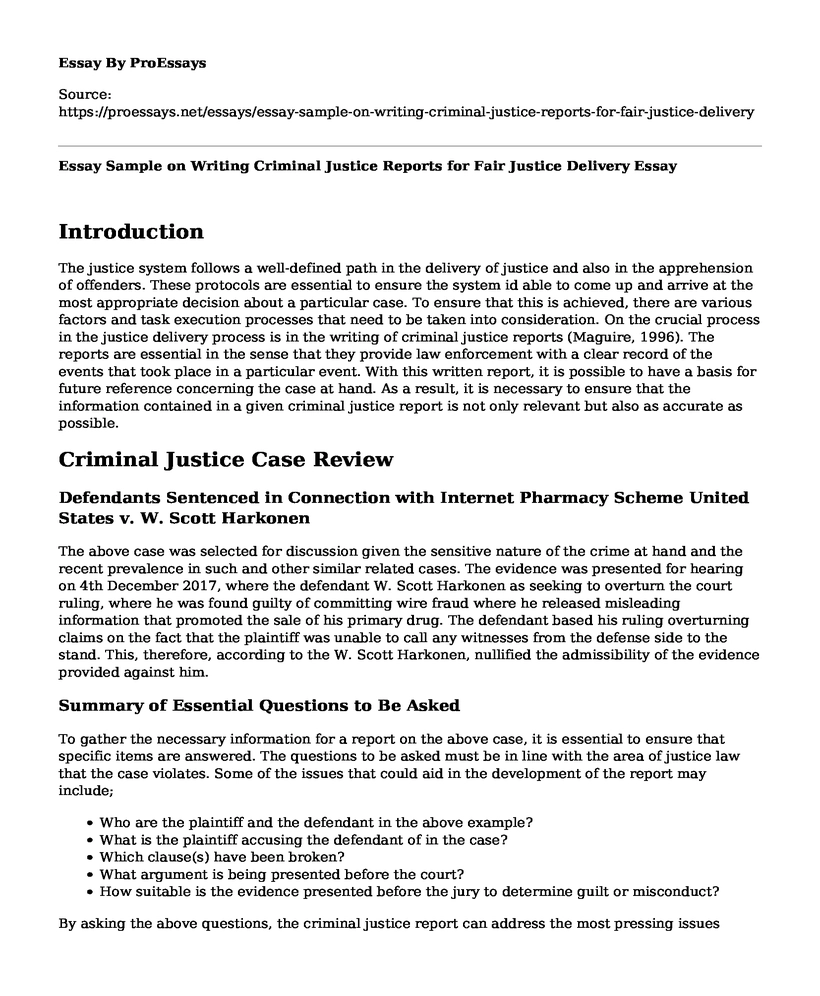Introduction
The justice system follows a well-defined path in the delivery of justice and also in the apprehension of offenders. These protocols are essential to ensure the system id able to come up and arrive at the most appropriate decision about a particular case. To ensure that this is achieved, there are various factors and task execution processes that need to be taken into consideration. On the crucial process in the justice delivery process is in the writing of criminal justice reports (Maguire, 1996). The reports are essential in the sense that they provide law enforcement with a clear record of the events that took place in a particular event. With this written report, it is possible to have a basis for future reference concerning the case at hand. As a result, it is necessary to ensure that the information contained in a given criminal justice report is not only relevant but also as accurate as possible.
Criminal Justice Case Review
Defendants Sentenced in Connection with Internet Pharmacy Scheme United States v. W. Scott Harkonen
The above case was selected for discussion given the sensitive nature of the crime at hand and the recent prevalence in such and other similar related cases. The evidence was presented for hearing on 4th December 2017, where the defendant W. Scott Harkonen as seeking to overturn the court ruling, where he was found guilty of committing wire fraud where he released misleading information that promoted the sale of his primary drug. The defendant based his ruling overturning claims on the fact that the plaintiff was unable to call any witnesses from the defense side to the stand. This, therefore, according to the W. Scott Harkonen, nullified the admissibility of the evidence provided against him.
Summary of Essential Questions to Be Asked
To gather the necessary information for a report on the above case, it is essential to ensure that specific items are answered. The questions to be asked must be in line with the area of justice law that the case violates. Some of the issues that could aid in the development of the report may include;
- Who are the plaintiff and the defendant in the above example?
- What is the plaintiff accusing the defendant of in the case?
- Which clause(s) have been broken?
- What argument is being presented before the court?
- How suitable is the evidence presented before the jury to determine guilt or misconduct?
By asking the above questions, the criminal justice report can address the most pressing issues concerning the ongoing case. For instance, the first question entails the determination of the stakeholders in the case who they are and what either party is accused of. This is essential information in the report being prepared that could be used in future hearings of the case if need be. It is also necessary to observe that the dates are also taken into consideration during the report preparation exercise (Maguire, 1996).
This helps to come up with accurate statements that can be traced back to a specific date, which is essential in the event of court proceedings as well as during subsequent hearings. The outlined question has, therefore, been specially selected to help in guiding the repot and also ensuring that there is no critical information left out. There are broader aspects of the report that may not have been included in the outlined questions that are necessary as well.
An Organizational or Note-Taking Strategy That Would Facilitate the Creation of This Report
Various approaches are utilized in the news making process, with one of the most fundamental methods being the note-taking process. The notes taken during the proceeding of a case are essential as they help in enhancing clarity of any unclear response in the report writing exercise. Today, professional services are being provided on the legal framework aspects which could help in the note-taking. Firms providing typing services, for instance, could be essential in ensuring that the note-taking process is carried out by a professional. This, in turn, transcends into a more accurate report writing given that the secondary source of data utilized for the exercise is accurate and reliable (Maguire, 1996).
Audio recording is also another note-taking strategy that could be utilized in the collection of essential information in the process of the case hearing. Given that the data is recorded in audio format, it is possible to identify the stakeholders in the given case as well as their utterances. This, therefore, could help in the provision of essential data in the report writing exercise. Unlike other forms of note-taking, the recording is a recommended approach as it is less time consuming as well as the accuracy involved with the method is also high.
Conclusion
From the above-gathered information, tit is, therefore, possible to identify the essential pieces of information that should be included in a criminal justice report to facilitate the justice delivery process. The justice reports should also strive to attain accuracy to ensure the credibility of the statements as a secondary source of information either in a future hearing of the given case or as a secondary source of information in other criminal justice research works.
References
Maguire, K. (Ed.). (1996). Sourcebook of criminal justice statistics 1995. Diane Publishing.
Cite this page
Essay Sample on Writing Criminal Justice Reports for Fair Justice Delivery. (2023, Apr 08). Retrieved from https://proessays.net/essays/essay-sample-on-writing-criminal-justice-reports-for-fair-justice-delivery
If you are the original author of this essay and no longer wish to have it published on the ProEssays website, please click below to request its removal:
- Essay Example - The Impact of Victimology
- Annotated Bibliography: Gun Control
- Legalizing Marijuana is Harmful to the Americans Essay
- Advocates for Child Abuse Victims Essay Example
- Essay Sample on Rape Kit Backlog
- Essay Sample on Effect of Architecture in Reducing Crimes: St. Louis Missouri vs. Oklahoma City
- Essay on Protecting Patient Confidentiality: HIPAA & Beyond







